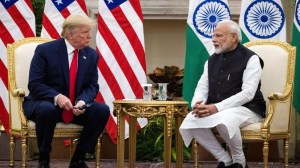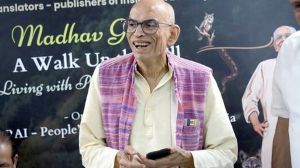SC refers MPs8217; immunity issue to panel
NEW DELHI, MAY 1: In a significant decision, the Supreme Court on Monday referred to a constitution bench the issue of whether MPs could h...

NEW DELHI, MAY 1: In a significant decision, the Supreme Court on Monday referred to a constitution bench the issue of whether MPs could have immunity from prosecution for voting in Parliament after taking bribe.
The issue assumes importance following a majority judgement in the JMM MPs bribery case that MPs who had accepted bribe could not be prosecuted for their act in Parliament, including voting.
Giving its ruling on a petition by an organisation, a three-judge bench comprising Justice S B Majmudar, Justice S Saghir Ahmed and Justice K T Thomas said the petitioner wanted quot;declaration regarding the correctnessquot; of the immunity provision under Article 105 2 of the Constitution without disturbing the judgement in JMM case.
quot;We direct that this matter be placed before a five-judge constitutional bench,quot; the bench said.
The petition, filed by the Centre for public interest litigation through advocate Prashant Bhushan, said it was not interested in what had happened in the past but quot;absolute immunityquot; should not be granted to the MPs against prosecution in the case of bribe taking.
Senior advocate Anil Diwan appearing for the petitioner said that the menace of corruption was posing a grave threat to the Parliamentary democracy and every dignitary right from the President and Prime Minister had been expressing concern about this.
quot;I am placing before the court a situation when some MPs give bribe to others to vote in Parliament in a particular manner and if people with criminal backgrounds are put in those positions, they will have little or no respect for the rule of law. This will subvert the very basis of Parliamentary democracy,quot; Diwan said.
Diwan made it clear that the petition did not want to disturb the findings in the judgement of April 1998 by a Constitution Bench in which three of the five judges held that the MPs who were allegedly bribed for voting in favour of the ruling party during the July 1993 no-confidence motion against P V Narasimha Rao government could not be prosecuted.
quot;We are on the question of the maintainability of the provision under Article 105 2 if it affects the rule of law,quot; he said.
There were quot;powerful dissentingquot; notes on this question by two judges in the five-judge bench that gave the ruling, he said, adding quot;this is a high time that the issue is addressed.quot;
While declaring MPs as public servants, the majority ruling in the JMM MPs bribery case had said that those MPs who voted inside Parliament after the alleged bribe could not be prosecuted as Article 105 2 provides them protection in this regard.
Consequently nine former MPs, who were charged with the bribery by the Central Bureau of Investigation, were discharged by the trial court and former minister Ajit Singh, whose name also figured in the list of bribe takers but did not cast his vote, was facing the trial along with Rao and ten others.
- 01
- 02
- 03
- 04
- 05































